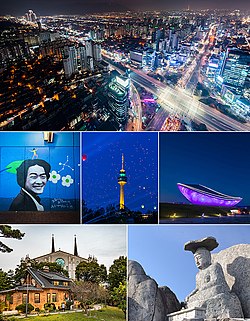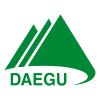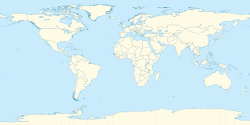Daegu
대구 | |
|---|---|
| transcription(s) | |
| • Hangul | 대구광역시 |
| • Hanja | 大邱廣域市 |
| • Revised Romanization | Daegu-gwangyeoksi |
| • McCune–Reischauer | Taegu-gwangyŏksi |
 Top: Beomeo Jct, Second: a portrait in Kim Gwangseok Street in Bangcheon Market, Daegu 83 Tower, ARC cultural center in Gangjeongbo riverside area, Bottom: Daegu Jeil Church and surrounding area, Gatbawi Statue in Gwanamsa Temple | |
 | |
 | |
| Coordinates: 35°52′18″N 128°36′06″E / 35.87167°N 128.60167°E | |
| Country | South Korea |
| Region | Yeongnam |
| Districts | 9 districts |
| Government | |
| • Type | Mayor–council |
| • Mayor | Hong Joon-pyo (People Power) |
| • Body | Daegu Metropolitan Council |
| Area | |
• Total | 1,499.51 km2 (578.96 sq mi) |
| Elevation | 106 m (348 ft) |
| Population (September 2024[1]) | |
• Total | 2,365,523 |
| • Density | 1,600/km2 (4,100/sq mi) |
| • Dialect | Gyeongsang |
| Demonym | Daeguite |
| GDP | |
| • Total | KR₩ 63 trillion US$ 50 billion (2022) |
| Area code | +82-53 |
| ISO 3166 code | KR-27 |
| Flower | Magnolia |
| Tree | Fir |
| Bird | Magpie |
| Website | Official website (English) |
Daegu (Korean: 대구; [tɛ̝.ɡu]), formerly spelled Taegu[a] and officially Daegu Metropolitan City (대구광역시), is a city in southeastern South Korea.
Daegu is the third-largest urban agglomeration in South Korea after Seoul and Busan; it is the fourth-largest metropolitan city in the nation with over 2.3 million residents;[5] and the second-largest city after Busan in the Yeongnam region in southeastern South Korea. Daegu and the surrounding North Gyeongsang Province are often referred to as Daegu-Gyeongbuk, with a total population of over 5 million.
Daegu is located in south-eastern Korea about 80 km (50 mi) from the coast, near the Geumho River and its mainstream, Nakdong River in Gyeongsang Province. The Daegu basin is the central plain of the Yeongnam region. In ancient times, the Daegu area was part of the proto-kingdom Jinhan. Subsequently, Daegu came under the control of the Silla Kingdom, which unified the Korean Peninsula. During the Joseon period, the city was the capital of Gyeongsang Province, one of the traditional eight provinces of the country.
Daegu was an economic motor of Korea during the 1960s–1980s period. The humid subtropical climate of Daegu is ideal for producing high-quality apples, thus the nickname, "Apple City".[6] Daegu is also known as "Textile City".[7] Textiles used to be the pillar industry of the city. With the establishment of the Daegu-Gyeongbuk Free Economic Zone, Daegu currently focuses on fostering fashion and high-tech industries.
Daegu was the host city of the 22nd World Energy Congress, the 2011 World Championships in Athletics and the 2003 Summer Universiade.[8] It also hosted four matches in the 2002 FIFA World Cup.
- ^ "Population statistics". Korea Ministry of the Interior and Safety. 2024.
- ^ 2022년 지역소득(잠정). www.kostat.go.kr.
- ^ EB (1878), p. 390.
- ^ "Photographic image of map". Archived from the original (JPG) on 2017-04-06. Retrieved 26 June 2022.
- ^ "Daegu Metropolitan Area Population Info". daegu.go.kr (in Korean). 2023-12-31. Retrieved 2024-06-04.
- ^ "Teaching jobs in South Korea". Eslstarter.com. Archived from the original on 2012-06-10. Retrieved 2012-07-21.
- ^ "Daegu - The City of Textile Industry". Archived from the original on 2012-07-26. Retrieved 2012-07-21.
- ^ FISU 22nd SUMMER UNIVERSIADE Archived 2011-08-14 at the Wayback Machine Retrieved 2011-10-12
Cite error: There are <ref group=lower-alpha> tags or {{efn}} templates on this page, but the references will not show without a {{reflist|group=lower-alpha}} template or {{notelist}} template (see the help page).




